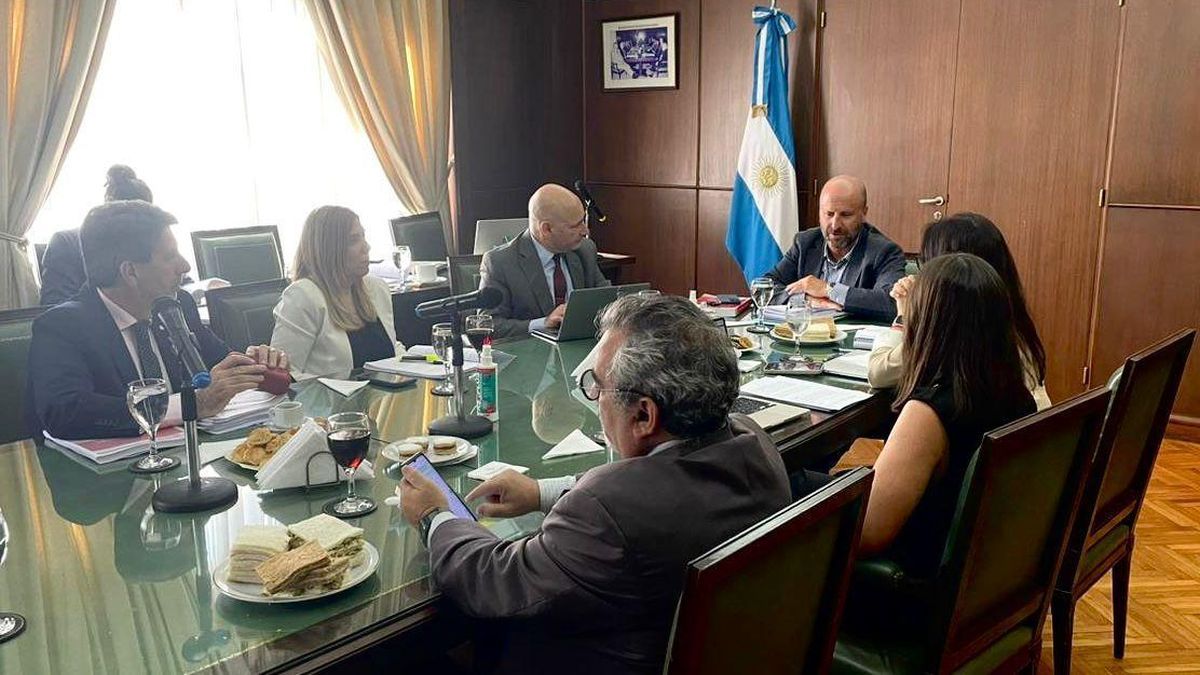The body, created and expanded by resolutions 25/2024 and 48/2024 of the Ministry of Justice of the Nation, met in the Agreement Room of the Federal Chamber of Criminal Cassation. There its members concluded the comprehensive review of the project and made corrections on various aspects aimed at giving systematicity and coherence to the new body of standards while achieving a uniform and easy-to-read text.
In addition, they analyzed some authoritative doctrinal proposals to improve the wording of customs criminal offenses, several of which were already included in the new document. Among the members of the commission, figures from the legal field stand out, including the Minister of Justice, Mariano Cúneo Libarona; the president of the Federal Chamber of Criminal Cassation, Mariano Borinsky and the federal judge María Eugenia Capuchetti.
Likewise, members of the Commission They debated the explanatory memorandum of the new project as well as the letter of the law for its eventual sanction.
With this meeting, said body completed the treatment of the latest legal figures and carried out the final adjustments to complete the project comprehensive reform of the Penal Code which aims to respond to the current needs of society and which will be presented next week before the Ministry of Justice of the Nation.
The judge also forms part of the commission. Ricardo Ángel Basilico; the jurists Julio César Báez, Jorge Eduardo Buompadre, Carlos Alberto Manfroni, Horacio Jaime Romero Villanueva, Fernando Oscar Soto and the jurists Valeria Onetto and Mercedes Rodríguez Goyena.
The changes proposed by the new Penal Code
At the beginning of the month, at the end of the writing stage, a series of changes were announced that will introduce andThe new Code as a “public official” and “public employee” which designates anyone who accidentally or permanently participates in the exercise of public functions, whether by popular election or by appointment by a competent authority; “merchandise” which refers to all types of goods that can be sold and to foreign currency; “narcotic drugs” which includes narcotic drugs, psychotropic drugs and other substances capable of producing physical or psychological dependence, which are included in the lists that are prepared and periodically updated by decree of the Executive Branch.
For its part, the term “clandestinity” which consists of a surreptitious occupation of the property, with concealment and taking advantage of the absence of the holderpossessor or quasi-possessor; while “senior person” refers to any human person over sixty years of age; and “guardian” is understood as someone who has charge or care of a minor, for any reason, without prejudice to the parental responsibility remaining with the parent(s).
“Torture” means not only physical torment, but also the imposition of psychological suffering.when these had sufficient gravity; “exploitation” when there is a relationship of subordination between the victim and the perpetrator regarding the exercise of their sexuality. While “discrimination” and “discriminatory” include any distinction, exclusion, restriction or any other conduct that implies a hierarchy of human beings based on religion, worldview, nationality, gender, sexual orientation and identity, social condition, affiliation or political ideology, characteristics ethnicities, physical traits, physical or mental illnesses, diminished capacity, racial prejudice or any other similar.
Later, the body focused on the last title, of the second book, referring to the crimes against intellectual property, There they advanced in crimes against copyright, against the ownership of trademarks and designations, against rights to industrial models and designs and patents, among others.
In this context, the experts decided that libraries are exempt from punishment in relation to copyright crimes; public archives and museums or those belonging to non-profit institutions; or scientific institutions or educational establishments; or the members of its bodies, who have intervened in the event, provided that the activity is directed to the fulfillment of its institutional purposes, and when they do not affect the normal exploitation of the work, nor cause significant damage to the legitimate interests of the author or his heirs.
The members of the Commission decided to include a Third Book to the Penal Code that criminalizes crimes against humanity, forced disappearance of a person, genocide, war crimes and crimes against the administration of justice of the International Criminal Court.
This decision is the result of the need to contain in the same framework a general part of these crimes, which have a different legal nature from the rest provided for in the preliminary draft.
With this objective, general rules applicable to these crimes and definitions contained in international instruments are incorporated into this new book, in order to grant them autonomy.
Among the specific general rules that characterize this type of crimes is the imprescriptibility of the criminal action and the sentence imposed; the inapplicability of the pardon or amnesty; universal jurisdiction; the impossibility of invoking as a defense the obedience due to the orders of superiors. For its formulation, conventions incorporated into our constitutional block and treaties on the subject to which Argentina has been bound were taken into account.
The Judge Maria Eugenia Capuchetti closed the meeting and highlighted the importance of the draft by saying “we achieved an orderly Code that integrates all the jurisprudence of the Supreme Court of Justice of the Nation, which is systematic, efficient and modern”, which will replace, which he called metaphorically, like a “wood lathe” and ended by saying “it was a pleasure to participate in this Commission in which as a team we worked with great care, dedication and effort and which also gave us the satisfaction of reaching this very good result.” .
The Commission, It was created and expanded by resolutions 25/2024 of February 28, 2024 and 48/2024 of March 13, 2024, of the Ministry of Justice of the Nation.
Source: Ambito




